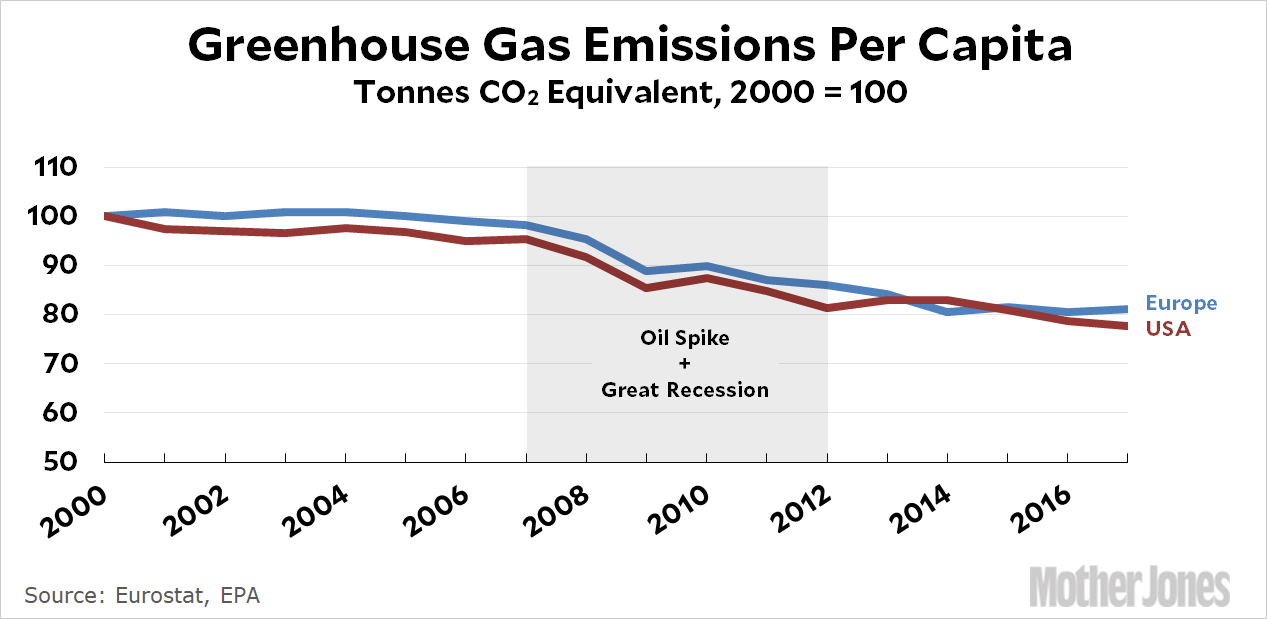The Political Realities of a Green New Deal
Kevin Drum uses some clever sleight-of-hand to demonstrate a hard truth about the human condition.
Some brilliant sleight-of-hand from Kevin Drum here:
I want to acknowledge that for all the infighting in liberal circles, the real problem is that full-scale climate denialism has taken over the Republican Party. This is what’s keeping us from making serious inroads into carbon emissions. In Europe, by contrast, there is no equivalent to the Republican Party. Nobody denies that climate change is real, and there’s no monolithic political opposition to doing something about it. As a result, over the past two decades Europe has been far more successful at reducing carbon emissions than the United States:
My initial thought was that Kevin had made a mistake in graphing because it doesn’t show what he’s us up to expect. But that was the point:
Wait. What’s going on here? In fact, the United States has reduced per-capita carbon emissions slightly more than Europe, and neither one has managed much reduction at all except when they’re forced to.¹ Nearly all of the reduction since 2000 came during the five-year period when oil prices spiked and the Great Recession killed off economic activity.
In other words, it doesn’t seem as if either the Republican Party or America’s dysfunctional politics is really the problem. So what is? It must be something common to both Europe and the US, and the obvious answer is that we all live in democracies. Roughly speaking, our governments do what the public wants, and the public doesn’t have much interest in reducing carbon emissions. Oh, we say we do, and we’ll support minor things like ETS or CAFE that have a barely noticeable effect on us. We’ll support solar power—if it produces electricity nearly as cheaply as coal. We’ll all buy electric cars—but only when the price comes down and the batteries get better. We’ll check out the energy star rating the next time we buy a new refrigerator. And that’s about it.
As for the rest of the world, I won’t even show you the chart. It’s too depressing. Outside of Europe and the US, carbon emissions are just going steadily up, up, up. Even the Great Recession barely made a dent. For the world as a whole, carbon emissions have increased more than 20 percent in the past two decades as poor countries try to catch up to the living standards of the West.
After a bit more discussion, he circles back to a seemingly obvious yet somehow controversial point:
Outside of war, I can’t think of an example in all of human history where a large polity—let alone the entire world—willingly made significant sacrifices in service of a fuzzy, uncertain hazard that’s decades away. We are overclocked hairless apes who are simply not designed to think that way. Why would anyone deny this?
I’d note that it’s been a few decades since we made any significant sacrifices even during wartime; we just put it on the national credit card.
So, what then? Just give up?
This, then, circles back to what I was saying a couple of days ago: A climate plan that requires significant sacrifice might work on planet Vulcan, but not on planet Earth. Assuming otherwise is nonserious. We need a plan that will work with only homo sapiens to carry it out, and that means a plan that takes into account human selfishness and shortsightedness. It means a plan that will appeal to China and India and Brazil and the rest of the world. It means a plan that will somehow reduce atmospheric carbon a lot even while most of us sit around fat, dumb, and happy.
The only such plan I can think of is one that increases global R&D spending on climate mitigation by, oh, 10x or so. Maybe 20x if it’s feasible. This money would be spent on developing new sources of clean energy and energy storage; reducing the price of current sources of clean energy; figuring out ways to remove carbon from the atmosphere; and pretty much anything else that seems remotely useful. The fruits of this research would be turned over to the private sector for free, and they would then compete to sell it all over the globe. This would harness human selfishness instead of fighting it. It’s not guaranteed to work, but unlike the GND and similar manifestos, at least it’s not guaranteed to fail.
That seems reasonable. He adds, in a Postscript, that he personally would prefer something more aggressive; he just doesn’t think it’s politically feasible for reasons already explained.







I don’t believe it’s ‘politically feasible’ that humankind is going to save itself from this problem, which is another way of saying that human groupthink is too stupid to deal with it. People who recognize reality will be considered unreasonable. It’s an extreme problem and therefore anybody who reacts to it in an extreme way will be treated as an extremist and marginalized.
Shorter version: people are dumb.
We are at war, we just don’t want to admit it.
No one ever talks about the elephant in the room. The Koch Bros and their accomplices have spent billions manipulating public opinion and lobbying and will continue to. Do you really think the Yellow Vest protests in France weren’t to some extent astroturfed with oil and coal money?
What Drum’s really saying is that this will play out like a bank bailout. The villains will somehow be made whole and the public will pay for it.
The last term in the Drake Equation, L, is the average lifetime of technologically-advanced civilizations. Global warming might show us that L is a much smaller number than we might expect.
The vast majority of humans have little to no imagination. They are not mentally capable of imagining a future, let alone figure out how to get there.
One of the reasons the teaching of history is so important is that it is one of the few tools available to engage the unimaginative mind – you can reason by analogy, you can say, ‘look how these people in the past failed or succeeded.’ But ask normal people to conform present actions to an imagined future? If people could do that we’d have no drug addiction, no unplanned pregnancies, no bankruptcy. . .
We make a mistake assuming that homo sapiens is defined by or led by its cleverer members. We aren’t generally as smart as the smartest, we are far more often as dumb as the dumbest.
It’s funny because the Republicans have been bashed for saying something similar: that we need technological innovation. The problem we face is very complex. It’s not just about putting solar panels in your roof. You have agriculture and construction, both of which produce enormous greenhouse gas emissions and both of which have no solution in sight. You have many people turning their backs on nuclear, the only real alternative to fossil fuels.
I agree with Drum: massive investment in tech. Make carbon-free tech that is good enough and cheap enough that we won’t have to force people to use it.
I’ve hoped I’ll be wrong in my cynical belief that we will cope with the problems caused by global warming (sorry polar bears) rather than reverse or even stymie the problem. Unfortunately our next political battle will not be about stopping the warming, but who will pay for the damage.
I don’t quite understand how Drum could write this whole post and leave out even a single reference to one of the best zero-emissions sources of energy out there, nuclear power.
@Doug Mataconis: Because he ruled out as politically infeasible a huge carbon tax. Nuclear power, when you factor in initial capital costs, liability, and decommissioning costs, not to mention the unsolved problem of nuclear waste, is by far the most expensive way to generate electricity, so without a huge carbon tax it can’t compete with coal and natural gas.
a back-of-the-envelope calculation says that in order to replace fossil fuel electricity generation just in the United States, we’d have to build 392 new nuclear reactors, and new nuclear reactors are running about 10 billion dollars a pop if memory serves me. And the first ones might come online around like 2032.
And even if we spent those trillions, which we won’t, electricity generation is only responsible for 28% of greenhouse gas emissions.
And for what it’s worth, the most recent estimate of what the Fukushima cleanup is going to cost is 200 billion dollars.
Long story short–humans had about 150 or so years to figure out that the earth was not made for them. From the discovery of the ice age, it was clear that whatever divine plan created the universe did not put humans at its center. Exxon knew about the effects of a carbon-economy in the 70s; they just didn’t care. We’re just as clueless now–maybe tech can magically save us while allowing us to change nothing but maybe it can’t. And if it can’t–nobody is going to change anything. We will have 2 feet of sea-level rise, a mass refugee crisis, governments turning countries into mindless fortresses. And people who are around now are going to be considered no different than Nazis or slaveowners or the Aztecs.
@Teve: I just had a great idea for what Trump could build his wall out of.
@Teve: What, then, is the alternative to nuclear? The trend certainly seems to be to phase out coal. Wind and solar may work in some areas, but there are major problems with both: animals, building codes, and land availability.
How about nuclear fusion? Clean, safe, abundant.
There are some plants under construction. The goal should be a working plan in this country by 2025.
There are some alternatives for cars. These would include hydrogen, bio – fuel turbine, and improved electric. But the American people are not going to be able to afford $40,000 or more for an ev. And the range problems inherent in ev’s needs to be solved or improved. If I am going on a six hundred mile trip to Disney World, stopping every two hundred miles for a long recharge is out of the question.
And these alternatives do not apply to heavy equipment, jet engines, and diesel trains. We can’t just “abolish jet travel” (Alexandria O. Cortez).
There needs to be more research, less regulations on new technology, and a new attitude toward enginuity and inventiveness.
See: CNN Pioneers “Is nuclear fusion about to change the world?”
I’m seeing a huge number of conservatives talk about nuclear power as the solution to global warming, because it lets them bash environmentalists for being opposed to it years ago. Keeping our current nuclear infrastructure operating is obviously the right thing to do, but expecting big new nuclear investments to solve the problem is a fantasy and the basic numbers show why.
Similar simple calculations show that carbon sequestration is a fantasy.
If we don’t substantially cut our energy consumption across several sectors, of which electricity is just one, we’ll get that scenario. And since we’re not going to cut our energy consumption, we’re going to get that scenario.
you think the middle East sucks now? Imagine how it’s going to look in 2040 when literally nobody can grow food there. Shit, drought is already a big factor in why Syria collapsed those several years ago.
I wonder what American farming’s going to look like as the ogallala aquifer dries up permanently.
@Tyrell: Two points:
1) If you actually know how to build a fusion power reactor, you are probably the only person in the world who can do it.
2) If you can build one and do it, you will go down in history as one of the great minds/achievers of history.
So, what are you waiting for. Start building. (In the alternative, stop bloviating about it as though we’re a decade away. We’ve been a decade away since I was 12.)
@just nutha: back when I was in physics, a grad student in a nuclear group eagerly showed me a prototype machine they were building with a brand new architecture that was finally going to contain the magnetic field and make fusion possible.
That was 16 years ago and I haven’t heard about it since.
@Hal_10000:
and a pony.
@Teve:
It’s a tad hard to contain a miniature star, isn’t it?
I’m willing to give a pass to the optimists in the 1950s. After all, they’d seen a rather rapid progression from fission bombs to fusion ones, so it made sense for something similar to happen with fission and fusion reactors. Alas….
The solution will take decades to achieve. That’s the big problem. you could substitute clean, or at least cleaner, sources today, only if people were willing to use far less energy. People won’t be willing to do this, and governments won’t force them to. I mean things like reducing imports from far away places, reducing travel, reducing consumption of all goods, and lots more.
Other solutions, like reducing human population, would take even longer and be harder to implement.
@just nutha:
It’s a matter of over-regulation. Get the government off the nuclear’s industry back and you’ll have tokamak startups producing results in no time flat.
There was this video of Ben Shapiro saying the following: “If climate change happens, and all the low-lying areas around the coast are underwater, don’t you think those people would just sell their house and move?” These people are not kidding about how fucking stupid they are.
@gVOR08: that’s like the grown up version of a five-year-old telling his parents that he will eat broccoli as soon as they make it taste as good as ice cream.
As I understand it, the all mighty G-d has given us all enough resources to last until the second coming of Christ.
So, the faster we burn the oil and coal, the sooner we’ll get Christ to return. Going green will only get us the opposite of Christ, the anti-Christ.
/S
For an actual economist who has studied this problem in depth and agrees that anything that doesn’t appeal to mass incentives won’t work:
But Will the Planet Notice? How Smart Economics Can Save the World
Gernot Wagner
(c) 2011
@Modulo Myself:
Um, you do understand the difference between fission and fusion, right? The nuclear industry builds fission reactors — cheap, plentiful, clean power that produces horrible radioactive waste that lasts thousands of years. Tokamaks are fusion reactors. Fusion is the power of the future, and always will be. If it worked, it would be awesome.
(I have been following the development of the ITER reactor project for more than a decade now, and I am no more confident of their eventual success than I am of living to be 100.)
James –
Though the misdirection is interesting, I think Kevin is somewhat glib about the obstacle that Republican climate denialism represents.
Yes, NO ONE wants to make significant sacrifices in the face of some hard-to-imagine hazard sitting out in the future. This spans the political spectrum.
But, even Kevin’s reasonable plan…
… isn’t politically feasible if one of the major parties is claiming full voice that climate change isn’t real.
Drum’s reasonable path forward in response to global warming is far more likely to emerge as a compromise from a pie-in-the-sky vision like the GND than it is from the head-in-the-sand condescension coming from the GOP.
@Teve: cut our energy consumption? When we can do things like this?
https://www.economist.com/the-economist-explains/2018/07/09/why-bitcoin-uses-so-much-energy
Bitcoin mining uses as much energy as Ireland. If we have to choose between Bitcoins and Ireland, I would choose Ireland, but I don’t think I get that choice.
@Modulo Myself:
It’s one thing to sell when your mortgage is underwater, but it’s an entirely different problem when the property is underwater.
@Tev: We should be dumping money into productionizing the pebble bed reactor designs — much safer (in theory) than the Fukushima design. And less of a nuclear proliferation concern, as you don’t need highly enriched uranium.
Right now, Germany had one, which they shut down after a minor accident, and China is building prototypes based on that German design. We are falling behind.
@Kathy:
I think it could be done in about 30 minutes, if we set our minds to it. You may want a more controlled reduction than a nuclear holocaust, though.
Alternately, we can do nothing, and as habitable spaces are sunk, and food production is wiped out, I think we will reduce the number of people. We will likely find a new steady state where we have as many people as can live on our hot, steamy planet with massive storms.
@Gustopher: I looked into Pebble bed reactors, also back when I was in physics, because they had this supposedly great quality of being “walk away safe”. No meltdowns. In reality, they have lots of problems, can jam, can catch on fire, have been tested like once and that one had an oopsie and leaked radiation, and they produce only a tiny fraction of the energy that a normal nuclear plant produces, and they add new nonproliferation risks by the hundreds, and you’d literally have to create and install thousands of them in the United States, which is also never going to happen.
There is no real solution to global warming that people will abide. The latter half of this century is going to be disasters and desperate attempts at geoengineering, which will create more disasters.
I just wonder if I’ll be alive to see the crazy shit we’ll attempt, like putting huge mylar reflectors in geosynchronous orbits above the Pacific to try to reflect away enough sunlight, which will have some ridiculous catastrophic effects on the ocean I’m sure.
@Teve: The jamming is specific to that design — they want to make sure the pebbles are cycled so they don’t have to shut down the plant for refueling. If we do away with that requirement, the entire system should be much simpler, and less prone to failure. Many, smaller reactors means that we can have some percentage out of commission at any time.
The catching fire can also be worked on.
Not sure about what the increased nonproliferation risks are, as my understanding is that it can use a less enriched fuel source. Removing the need to enrich uranium to roughly weapon levels for energy should cut the amount of dual use technologies. But, I could be wildly misinformed.
I also tend to put dirty bombs at a much over level of concern than nuclear fission weapons. The risks of some bad actor getting ahold of some pebbles is higher.
Compared to giant mylar reflectors, or seeding clouds with reflective dust, or whatever other insane geoengineering solutions we come up with, it seems like a promising technology that we shouldn’t give up on after one failure of one design.
@Kathy: I could be wrong about this part, but I suspect that it might be hard to make a miniature star, too.:)
ETA: “you could substitute clean, or at least cleaner, sources today, only if people were willing to use far less energy.”
Add that a lot of “willing to use far less” entails willing to forego the advantages of shipping goods (particularly food) around the world,and it complicates the formula even more.
@PJ: I know people who think exactly that. Not snarky at all, it’s part of the real world in which we’re living. Terrifying.
Americans won’t even do simple things, like addressing electricity/appliance leaking. We visit the UK frequently, and it takes us a day or two to remember that we need to turn on outlets, after that it’s no big deal. There is no way we as a country are going to address this problem with any degree of sincerity or focus, and it won’t be that long before melting starts to release methane, which will accelerate warming. We’re heading to a runaway train effect, and it isn’t going to be pleasant.
Is nuclear power globally scalable?
(TL;DR: HAHAHAHA Fuck No. But Solar Thermal Probly is.)
the non-proliferation issue is that if a pebble bed reactor only produces 5 to 10% of what a regular nuclear installation produces, then you don’t need 400 new nuclear plants in the US, you need 4000-8000 new nuclear sites. That’s potentially more nuclear sites to keep locked down than there are Burger Kings. And talk about permitting and siting issues, you’re now talking about two new nuclear sites per county on average.
That IEEE article shows my guesstimates were too optimistic, even.
@Jen:
17ish years ago I was in a BioGeoChem class at NC State, and everybody was just kind of shooting the shit, and somebody asked the professor you know how worried are you about global warming? And he pondered for a few seconds and said “…well it depends. It’ll probably just really suck. But the thing nobody is really talking about are the methane hydrates on the seafloor. If those things start to go, then we’re all fucked.”
@Hal_10000: Construction: some of these people who are complaining about fossil fuels don’t seem to have a problem using the sidewalks, streets, buildings, highways, bridges, food, supplies, water, and hospitals. All of these were built with heavy equipment: bulldozers, backhoes, graders, cranes, concrete trucks, and other various equipment that runs on gas or diesel. And the trucks that bring in food and other necessary material.